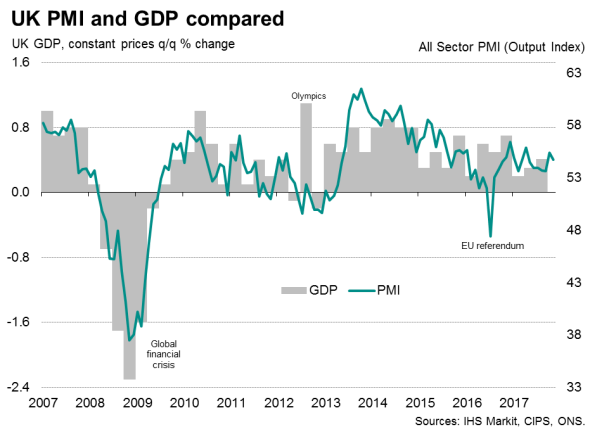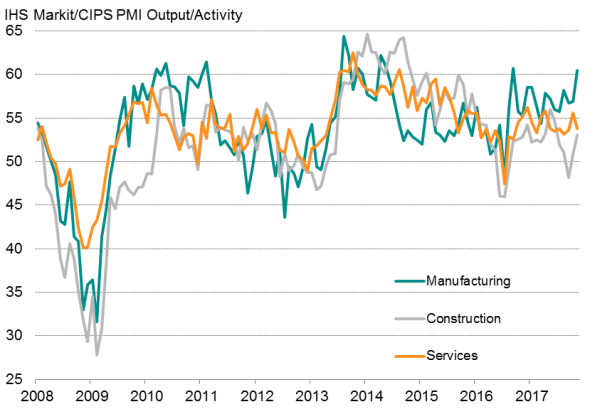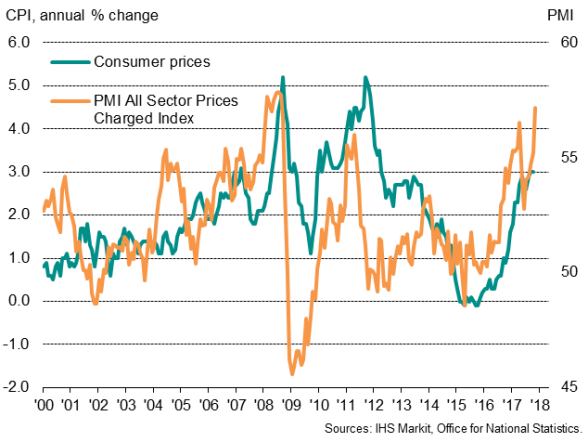Customer Logins
Obtain the data you need to make the most informed decisions by accessing our extensive portfolio of information, analytics, and expertise. Sign in to the product or service center of your choice.
Customer Logins
ECONOMICS COMMENTARY
Dec 05, 2017
UK PMI surveys show steady growth marred by decade-high price pressures
The latest PMI™ surveys indicate that the economy is on course to sustain steady growth in the closing months of 2017, albeit with the expansion waning in November. Slower service sector growth came as a particular disappointment after improved performances of both manufacturing and construction in November. Business confidence also continued to be subdued by Brexit worries. Meanwhile, in a sign that inflation may rise further in coming months, prices charged for goods and services rose to the greatest extent seen for nearly a decade.

Solid fourth quarter growth
The 'all-sector' IHS Markit/CIPS PMI Output Index fell from a six-month high of 55.4 in October to 54.7 in November. Despite the decline, the latest reading was the second-strongest registered over the past seven months and adds to indications that the economy is on course to enjoy robust growth in the fourth quarter. The survey data are so far consistent with the economy growing at a quarterly rate of 0.45% in the closing months of 2017.
There was mixed news by sector, with faster manufacturing and construction growth countered by a slowdown in services. Manufacturing, buoyed in part by the historically weak pound and strong growth in overseas markets, reported the fastest output growth since September of last year and the second-largest gain for over three years.
An upturn in house building also helped drive a revival in the construction sector, where output showed the biggest gain for five months. However, the overall rate of construction expansion was subdued by declines in both commercial building and civil engineering activity.
Service sector growth meanwhile slowed from Octobers' six-month high, dipping slightly below the average seen in the year-to-date. Recent months have seen very varied performances between the sub-sectors of the services economy. Growth is currently being led by financial services and the hotels and restaurants sectors, the latter likely buoyed by tourist spending rising on the back of the weak exchange rate. But growth has meanwhile waned for business services and transport and communications, though the worst performing sub-sector has been IT and computing, which has seen its worst performance for over five years in recent months.
Output of the three main sectors

Sources: IHS Markit, CIPS.
Fragile outlook
>Future expectations about companies' business activity levels in a year's time ticked higher in November but nevertheless remain very low by historical standards, underscoring the potential for risk aversion to intensify and subdue growth if the news flow relating to Brexit deteriorates.
Uncertainty about the economic outlook, linked commonly to Brexit worries, continued to permeate the business mood. However, for now, the survey data indicate that a sufficient degree of optimism in pockets of the economy, notably financial services, tourism, manufacturing and house building, is helping the economy as a whole to sustain steady growth.
Employment buoyed by factory hiring
Companies also remained sufficiently upbeat to continue hiring. Employment growth across the three major sectors ticked slightly higher in November after sliding to a seven-month low in October, led by the largest manufacturing jobs gain for nearly three-and-a-half years. However, service sector employment growth remained especially subdued, albeit in some cases linked to skill shortages.
Near-record price rise
The big news is in relation to prices, with the PMI surveys pointing to the largest monthly increase in average prices charged for goods and services since August 2008; a time when oil prices soared just before the global financial crisis.
Rising oil prices were again to blame in November, with firms also reporting the need to pass higher costs of a wide variety of other inputs on to customers as a result of the weak pound having driven up import prices. As such, the survey data add to suspicions that inflationary pressures have yet to peak.
Inflation

Chris Williamson, Chief Business Economist, IHS Markit
Tel: +44 20 7260 2329
chris.williamson@ihsmarkit.com
{"items" : [
{"name":"share","enabled":true,"desc":"<strong>Share</strong>","mobdesc":"Share","options":[ {"name":"facebook","url":"https://www.facebook.com/sharer.php?u=http%3a%2f%2fstage.www.spglobal.com%2fmarketintelligence%2fen%2fmi%2fresearch-analysis%2f05122017-Economics-UK-PMI-surveys-show-steady-growth-marred-by-decade-high-price-pressures.html","enabled":true},{"name":"twitter","url":"https://twitter.com/intent/tweet?url=http%3a%2f%2fstage.www.spglobal.com%2fmarketintelligence%2fen%2fmi%2fresearch-analysis%2f05122017-Economics-UK-PMI-surveys-show-steady-growth-marred-by-decade-high-price-pressures.html&text=UK+PMI+surveys+show+steady+growth+marred+by+decade-high+price+pressures","enabled":true},{"name":"linkedin","url":"https://www.linkedin.com/sharing/share-offsite/?url=http%3a%2f%2fstage.www.spglobal.com%2fmarketintelligence%2fen%2fmi%2fresearch-analysis%2f05122017-Economics-UK-PMI-surveys-show-steady-growth-marred-by-decade-high-price-pressures.html","enabled":true},{"name":"email","url":"?subject=UK PMI surveys show steady growth marred by decade-high price pressures&body=http%3a%2f%2fstage.www.spglobal.com%2fmarketintelligence%2fen%2fmi%2fresearch-analysis%2f05122017-Economics-UK-PMI-surveys-show-steady-growth-marred-by-decade-high-price-pressures.html","enabled":true},{"name":"whatsapp","url":"https://api.whatsapp.com/send?text=UK+PMI+surveys+show+steady+growth+marred+by+decade-high+price+pressures http%3a%2f%2fstage.www.spglobal.com%2fmarketintelligence%2fen%2fmi%2fresearch-analysis%2f05122017-Economics-UK-PMI-surveys-show-steady-growth-marred-by-decade-high-price-pressures.html","enabled":true}]}, {"name":"rtt","enabled":true,"mobdesc":"Top"}
]}





